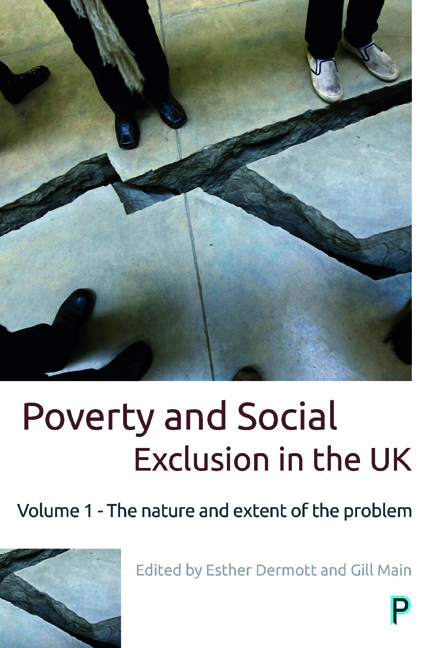Book contents
- Frontmatter
- Dedication
- Contents
- List of tables and figures
- Notes on contributors
- Acknowledgements
- Introduction: poverty and social exclusion in the UK
- One Measuring poverty in the UK
- Two The impoverishment of youth: poverty, deprivation and social exclusion among young adults in the Uk
- Three Improvement for some: poverty and social exclusion among older people and pensioners
- Four Which men and women are poor? Gender, poverty and social exclusion
- Five Better understandings of ethnic variations: ethnicity, poverty and social exclusion
- Six Improving lives? Child poverty and social exclusion
- Seven The cost of children: parents, poverty, and social support
- Eight A worsening picture: poverty and social exclusion and disabled people
- Nine Devolution and North/South division: poverty and social exclusion in the countries and regions of the UK
- Ten More similarities than differences: poverty and social exclusion in rural and urban locations
- Conclusion: innovating methods, informing policy and challenging stigma
- Technical appendix
- Index
Three - Improvement for some: poverty and social exclusion among older people and pensioners
Published online by Cambridge University Press: 08 April 2022
- Frontmatter
- Dedication
- Contents
- List of tables and figures
- Notes on contributors
- Acknowledgements
- Introduction: poverty and social exclusion in the UK
- One Measuring poverty in the UK
- Two The impoverishment of youth: poverty, deprivation and social exclusion among young adults in the Uk
- Three Improvement for some: poverty and social exclusion among older people and pensioners
- Four Which men and women are poor? Gender, poverty and social exclusion
- Five Better understandings of ethnic variations: ethnicity, poverty and social exclusion
- Six Improving lives? Child poverty and social exclusion
- Seven The cost of children: parents, poverty, and social support
- Eight A worsening picture: poverty and social exclusion and disabled people
- Nine Devolution and North/South division: poverty and social exclusion in the countries and regions of the UK
- Ten More similarities than differences: poverty and social exclusion in rural and urban locations
- Conclusion: innovating methods, informing policy and challenging stigma
- Technical appendix
- Index
Summary
Broader policy and research context
Research into older people and pensionershas garnered a lot of academic and policy attention during the past decade. There are of course good reasons for this. From a demographic or population ageing perspective the sheer number of older people in the UK is at the highest level it has ever been in both absolute and relative terms. Estimates place the proportion of people aged 65 years or older at approximately 22% of the population which equates to roughly 13 million persons (ILC-UK, 2013). The number of pensioners has also increased dramatically last 20 years, with an estimated 26 million having reached state pension age (SPA). While longevity is a cause for celebration, it is also important to recognise that the UK's rapidly ageing society offers a number of short- and long-term policy challenges (McKee, 2010). Although the main policy focus to date has been on care and pensions, great strides have been made in improving the financial situation of older people and pensioners, particularly those on lower incomes who are reliant on state pensions and other age- or disability-related benefits (for example, housing benefit, pension credit guarantee, council tax benefit, disability living allowance, carer's allowance) to make ends meet. A lot has been written over the past decade or so regarding the generally improved economic, material and social position of pensioners and older people in the UK. At the time of the UK Poverty and Social Exclusion Survey 2012 (PSE-UK 2012), the proportion of pensioners living in lowincome poverty was at the lowest level it had been for almost thirty years (MacInnes et al, 2013). Pensioners are now less likely to be in financial poverty than the majority of non-pensioners after housing costs (McKee, 2010). McKee goes on to suggest that although this progress should be welcomed, ‘much less progress has been made in helping those pensioners in more severe and persistent poverty’ (2010, p 20). In short, the poorest pensioners have fallen further behind middle-income pensioners, although inequality within most of the top half of the pensioner income distribution has changed little (Cribb et al, 2013). In addition, the measurement of social exclusion is a relatively recent endeavour, with little attention paid to older people (Price, 2008).
- Type
- Chapter
- Information
- Poverty and Social Exclusion in the UK Vol 1The Nature and Extent of the Problem, pp. 61 - 94Publisher: Bristol University PressPrint publication year: 2017



